Low Carb Diet For People With Food Allergies
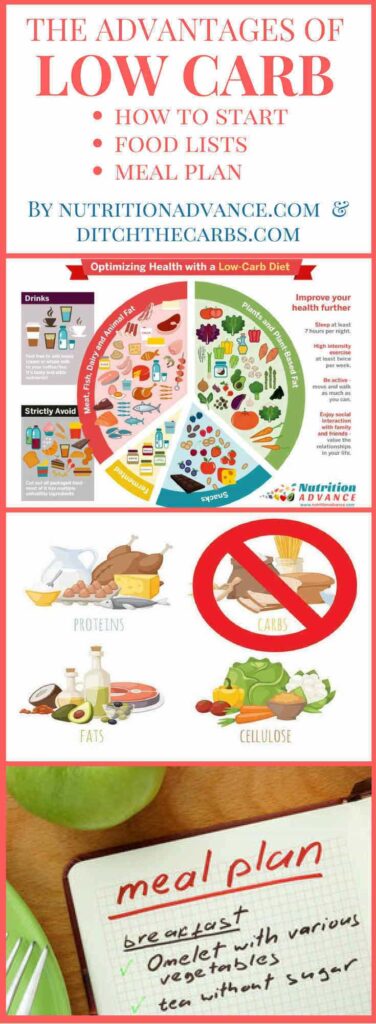
Advantages Of A Low-Carb Diet is an article was written by Michael Joseph and reviewed by Raphi Sirtoli, MSc.
To ditch the carbs for good, you need to understand the advantages of a low-carb diet, how to start, what to eat and how to avoid the common mistakes.
Jump to:
- The advantages of a low-carb diet: Why you need to Ditch The Carbs
- 1. Advantages of a low-carb diet on blood sugar and insulin levels
- 2. Advantages of a Low-Carb Diet For Hunger
- 3. Advantages of a Low-Carb Diet For the Heart
- 4. Advantages of a Low-Carb Diet For Weight Loss
- How do I follow a low-carb diet?
- How Many Carbs Should I Eat On a Low-Carb Diet?
- Which Low-Carb Foods Are Healthy?
- 💬 Comments

This is a guest post by Michael Joseph who is a nutrition educator with a master's degree in Nutrition Education. He is the founder of Nutrition Advance where he frequently writes nutrition and health-related articles.
The advantages of a low-carb diet: Why you need to Ditch The Carbs

In truth, fat is essential for your health, carbohydrates are not. This article will explain how to start a low-carb diet, what to eat and there is a sample meal plan at the end. But let's begin by taking a look at a few of the main advantages of a low carb diet.
1. Advantages of a low-carb diet on blood sugar and insulinlevels
Eating carbohydrates have the biggest impact on our blood sugar and insulin levels. Restricting carbohydrates in our diet has a direct result in lowering our sugar levels and insulin needs. High sugar levels play a part in almost all chronic diseases such as type 2 diabetes, dementia, cancer and cardiovascular disease.
By lowering carbohydrate intake, blood sugars are controlled and insulin levels are minimised. This is incredibly beneficial for those with diabetes (type one or two) and those with insulin resistance.
2. Advantages of a Low-Carb Diet For Hunger
Low-carb diets tend to improve signals of satiety (wanting to put the fork down) and satiation (wanting to delay the next meal).
Stable blood sugars and moderate levels of blood insulin may be partly responsible for these healthful changes.
In a comprehensive study analyzing food cravings and appetite, participants on a low-carb diet were directly compared to participants on a typical low-fat diet. The results showed that the low-carb group suffered much lower cravings and were a lot less bothered by hunger.
Due to the appetite normalizing effects of dietary fat, anyone who has adopted a low-carb diet will know this for themselves.
3. Advantages of a Low-Carb Diet For the Heart
Low-carb diets have a beneficial impact on a whole host of heart disease risk factors. Specifically, they reduce triglycerides (a major risk factor for cardiovascular disease) and increase the concentrations of HDL (known as the "good" cholesterol).
Additionally, they lead to reduced blood sugar, insulin, and often help remove the triggers of chronic inflammation in the body; all of these things can be damaging to the heart. As well as this, another big advantage is fat loss, since a higher fat mass and obesity increase cardiovascular risk.
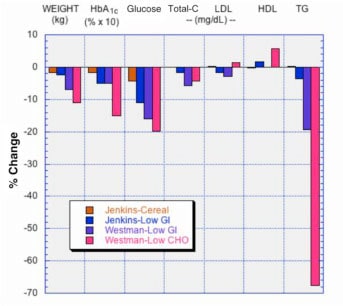
Here is a study documenting all these positive effects of an LCHF diet.
- Lower triglycerides
- Increased HDL levels
- Lowered glucose and insulin levels
- Increased weight loss
- Increased fat loss
- Reduced systemic inflammation

4. Advantages of a Low-Carb Diet For Weight Loss
To investigate the impact of a low-carb diet on weight, Harvard School of Public Health analyzed more than 53 different studies featuring more than 68,000 participants.
The results were not surprising: out of all the dietary fat-loss interventions, the individuals using low-carb interventions lost greater weight than participants on low-fat interventions.
Considering how the personal anecdotes and new studies are piling up by the day, it's clear to see that the advantages a low-carb diet brings are worth pursuing.
Not only do you get to eat amazingly fresh, delicious foods every day, but you also vastly improve your health and decrease the risk of illness striking in the future.
For me, it's a no-brainer, and I promise that if you get the hang of a low-carb diet, you won't even want to go back to your prior way of eating.
Once you have a taste for real food, all the ultra-processed foods taste terrible.
How do I follow a low-carb diet?
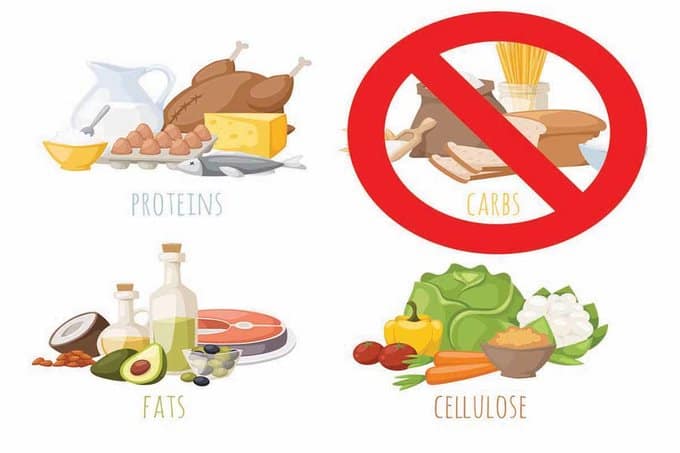
At its most basic, the low carb diet (or LCHF: low-carb high-fat) means eating plenty of healthy animal foods as well as nutrient-dense plant foods. We should encourage and emphasise the most nutritious types of these plant foods.
Look at spinach or an avocado; they are full of nutrients yet very low in digestible carbohydrates which turn to sugar in the body. By the same token, if we examine bread or rice then sure, they do have a few nutrients, but not so many.
Added to that, they also contain a significant amount of digestible carbohydrate which will make fat burning harder or stabilizing unstable blood sugars.
Looking at the picture above, we can see that the three most nutrient-dense food groups are encouraged.
How Many Carbs Should I Eat On a Low-Carb Diet?
If you are just starting a low-carb diet, this can be confusing. In brief, one man's low-carb diet is another man's high-carb diet. By that, I just mean that there is no one-size-fits-all amount of carbohydrate you need to eat.
However, to get the best advantages of a low-carb diet, it's better to aim at the lower end of the scale.
Some easy targets to follow are:
- Moderate low-carb – 100g net carbs or below each day
- Low-carb – 50g net carbs per day
- Keto – 20g net carbs per day, or less

Extremely Low-Carb Diet Plans
Typically, diets extremely low in carbohydrate contain 20g per day or less of carbs. This way of eating is otherwise known as a ketogenic diet. For most people, following an extremely low-carb diet is optional rather than necessary.
Some people enjoy the low-carb, high-fat (LCHF) lifestyle just for overall healthier eating and the benefits on body composition. For others, though, keeping the carbohydrate low is a more critical pursuit.
Low-Carb Diets and Type 2 Diabetes
Due to what many see as the failure of dietary guidelines to manage the rising tide of type 2 diabetes, many diabetics have been turning to the low-carb diet. This decision makes complete sense.
In a healthy person, insulin is released in a timely and measured way to coordinate the metabolic response keeping your cells fed and your blood sugars stable:
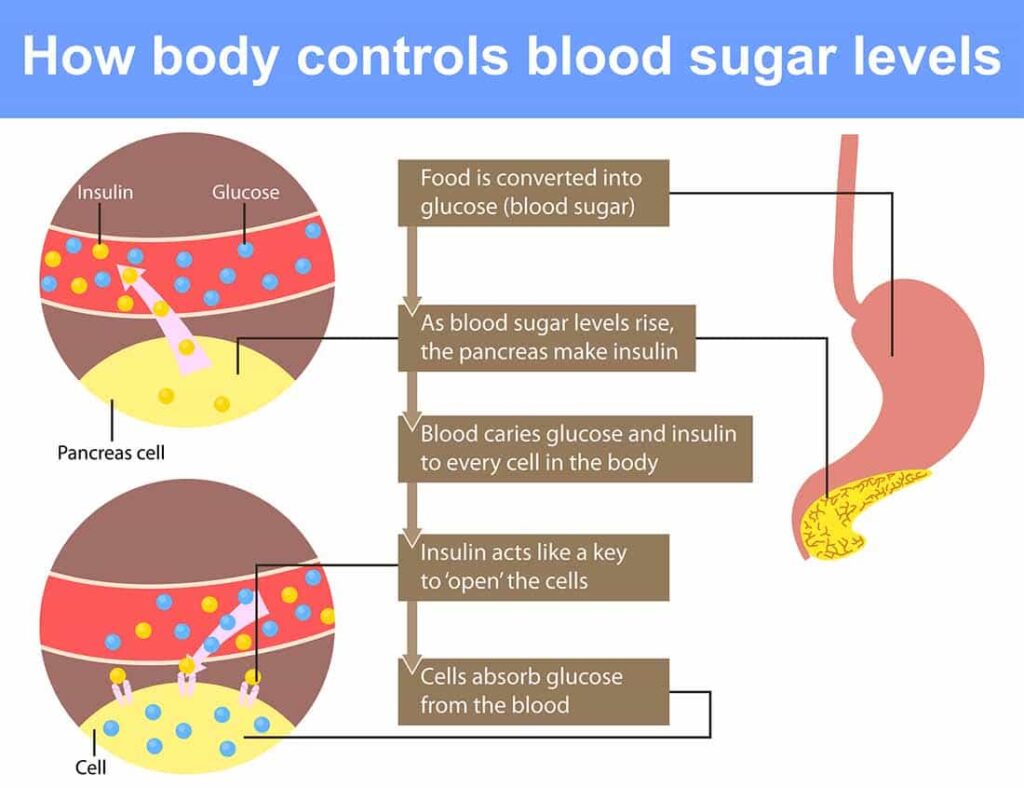
To make a complicated story simple; in Type two diabetics, the pancreas is now producing an inadequate amount of insulin which the body's cells have become resistant to. The result is unchecked, rapidly rising blood sugar levels when eating foods that convert to glucose. Therefore, you could say that these people are intolerant to carbohydrate.
That brings us to the question: why would we feed a plate full of carbohydrate to someone with an intolerance to it? As well as this, protein and fat do not have a significant impact on blood sugar levels. As a result, ditching the carbs takes away the one dietary macronutrient that causes blood sugar spikes in diabetics.
While it's generally accepted that there's no cure for type 2 diabetes, a low-carb diet may permanently reverse the disease. And it has for many.
Want to start low-carb FAST? Learn how to start low-carb with the best deal of the year! DON'T WAIT - BUY NOW

A Relaxed Low-Carb Diet
A carbohydrate intake of anywhere between 25g and 150g digestible carbs qualifies as a more relaxed low-carb diet. While 150g of carbohydrate is far from a small amount, it's still a vast improvement to the standard carb-heavy diet most westernized nations follow.
Opting for a carb intake on the higher side of the scale may also be a choice for athletes who feel it helps their performance. However, elite sports performance is still definitely possible on lower amounts of carbs.
All things considered, the true advantages of a low-carb diet quickly become apparent on the lower side of the scale.
As a result of going very low carb, many people experience effortless weight loss, more energy (after the initial adaptation period), and an altogether healthier relationship with food.
Personally, I usually stick to somewhere between 50g and 80g per day. However, more than half of the total tends to come from fibrous plant foods such as avocado, nuts, dark chocolate and leafy greens.
Common Mistakes

It's also worth remembering a typical mistake many people make when they ditch the carbs. By this, I'm referring to the error of not replacing the reduced carbs with enough healthy sources of fat. As a result, people quite understandably feel terrible and struggle through the day with a lack of energy combined with food cravings. The result is getting stressed and ultimately giving up on their new diet before giving it a chance.
Hence low carb diets should emphasize larger amounts of fat, but the source of this dietary fat is critical as there are plenty of bad fats out there. A good rule of thumb is to stick to naturally-occurring fats from nature, rather than chemically processed ones created in a factory. As an example, organic grass-fed butter and margarine are poles apart regarding their respective health merits. And hopefully, you know that butter is the healthy one!
Another thing to (not) consider is the GI index of carbohydrate. Regarding this, you should be aware that the glycemic index of foods has no relation to low-carb eating. Although many people associate 'high GI' with bad and 'low GI' with good, all this means is that the body digests some carbs slower than others. No matter the speed, they are still all digested and contribute to the carbohydrate total.
Select the right amount of carbs for you and don't be afraid of adding more healthy fat.
Which Low-Carb Foods Are Healthy?
Generally speaking, low-carb diets should include lots of fresh, single-ingredient foods. However, this isn't always the case, and it is possible to 'do' a low-carb diet wrong.
In short; to experience the advantages of a low carb diet you have to formulate your diet correctly. To sum up, the food choices you make will determine whether your low-carb diet is healthy or unhealthy.
Hence here is an infographic that I created to show an overview of the best foods to include:

This graphic provides a good overview of how a low-carb diet should look. Also, let's take a look at the individual food groups in a bit more detail.
NEXT PAGE: to see what to eat, what to avoid and a FREE 5-day low-carb meal plan.
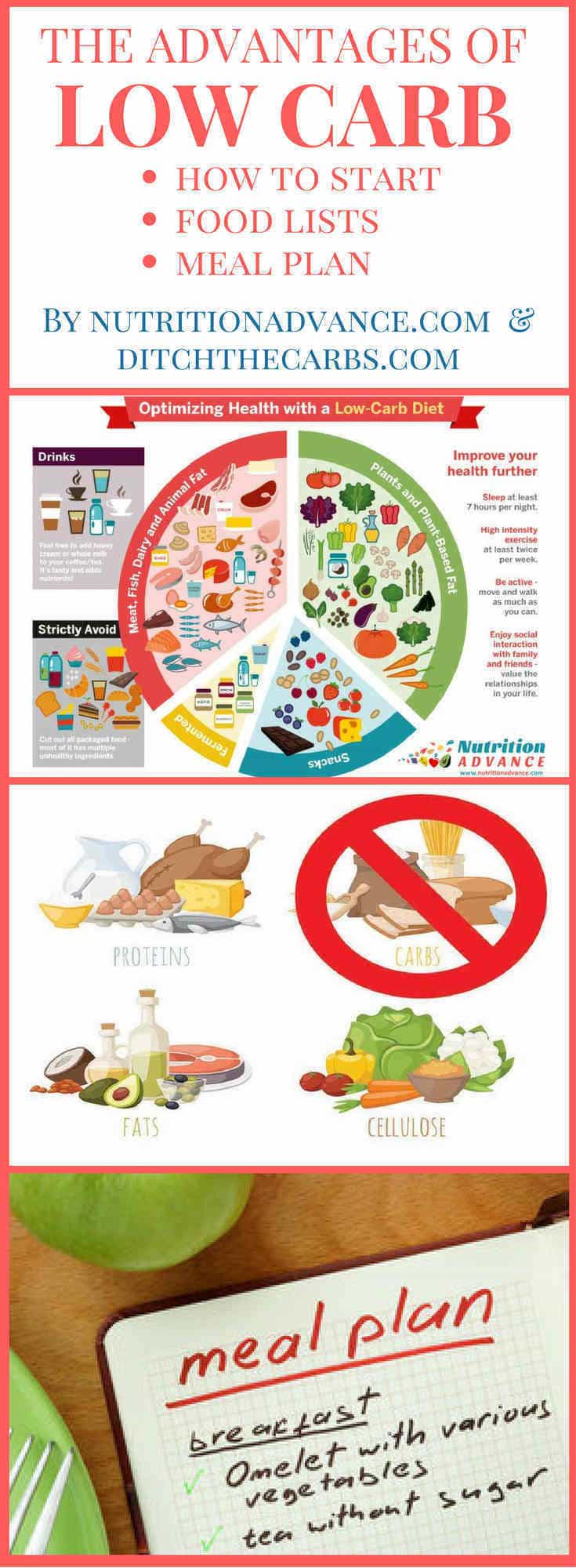
Low Carb Diet For People With Food Allergies
Source: https://www.ditchthecarbs.com/advantages-of-a-low-carb-diet/

Tidak ada komentar: